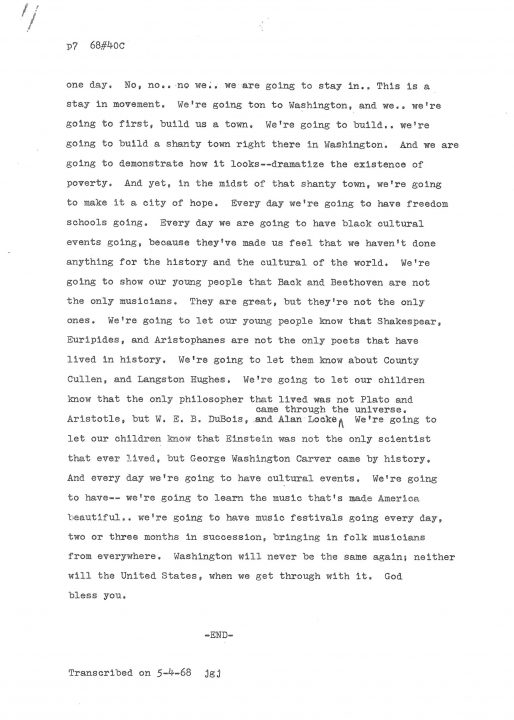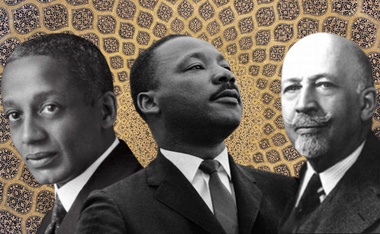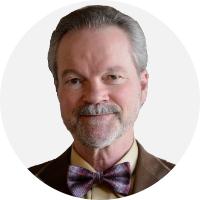The views expressed in our content reflect individual perspectives and do not represent the authoritative views of the Baha'i Faith.
The Rev. Dr. Martin Luther King, Jr. declared: “We’re going to let our children know that the only philosophers that lived were not Plato and Aristotle, but W. E. B. Du Bois and Alain Locke came through the universe.”
That’s why, back in 2014, I started calling Alain Locke “Black Plato.” Since then, more information has come to light about Dr. King’s famous proclamation.
RELATED: Black Plato and the Harlem Renaissance
On February 17, 2014, Kathy Shoemaker, Research Services Associate Archivist, Manuscript, Archives, and Rare Book Library, Emory University, kindly sent me a digital scan of the manuscript of Dr. King’s speech. I replied:
I’m speechless! For years, I’ve yearned to read this speech! You have made this dream come true! I’ve just read this magnificent speech silently. The words cried out to be shouted, because they are still timely today (although in not quite the same way, as times have changed). Being in a Starbuck’s right now, I had to restrain myself from reading this compelling speech volubly.
This stirring passage, at the very end of Dr. King’s March 19, 1968 speech, made me want to holler:
We’re going to show our young people that Bach and Beethoven are not the only musicians. They are great, but they’re not the only ones. We’re going to let our young people know that Shakespeare, Euripides, and Aristophanes are not the only poets that have lived in history. We’re going to let them know about Countee Cullen, and Langston Hughes. We’re going to let our children know that the only philosophers that lived were not Plato and Aristotle, but W. E. B. Du Bois, and Alan [Alain] Locke came through the universe. We’re going to let our children know that Einstein was not the only scientist that ever lived, but George Washington Carver came by history. … And every day we’re going to have cultural events. We’re going to have — we’re going to learn the music that’s made America beautiful . . . We’re going to have music festivals going every day, two or three months in succession, bringing in folk musicians from everywhere. Washington will never be the same again; neither will the United States, when we get through with it. God bless you.

Dr. King’s expression, “came through the universe” sounds rather unique – singularly eloquent, rhetorically effective, condensed and yet expansive – and it endows history with a metaphysical dimension, consecrating human agents of change for social transformation with cosmic purpose. It makes Dr. King’s tribute to W. E. B. Du Bois and Alain Locke memorable — and therefore worth remembering.
It also builds a bridge between Locke, the Black “Dean of the Harlem Renaissance,” and the teachings on racial unity from his Baha’i beliefs, expressed here by Abdu’l-Baha in a speech he gave in London:
… through the zeal and ardour of the pure of heart, the darkness of hatred and difference will be entirely abolished, and the light of love and unity shall shine; this world shall become a new world; things material shall become the mirror of the divine; human hearts shall meet and embrace each other; the whole world become as a man’s native country and the different races be counted as one race.
Dr. King’s comparison of W. E. B. Du Bois and Alain Locke to Plato and Aristotle is all the more poignant, given Dr. King’s very high regard for Plato, as anecdotally illustrated in Martin & Malcolm & America: A Dream or a Nightmare by James Cone:
The most persuasive evidence of Martin’s gradual move toward separatism is found in his speeches to blacks in early 1968 during his tour of the South in preparation for the Poor People’s Campaign. He accented much more frequently the positive aspects of black culture and its intellectuals. Before Black Power, white personalities had dominated King’s idea of excellence and the black models were the ones whom whites had portrayed as Negroes worthy of emulation (i.e., Booker T. Washington, George Washington Carver, Roland Hayes, Jesse Owens, Joe Louis, Marion Anderson, and Jackie Robinson). King taught a “seminar in social philosophy” at Morehouse College during the first semester of the 1961–62 academic year and did not use one required text written by an African-American scholar. The writings of Plato, Aristotle, Augustine, Aquinas, Machiavelli, Hobbes, Locke, Rousseau, Kant, and Hegel were his choices. During the Playboy interview, Alex Haley asked him: “If you were marooned on the proverbial desert island, and could have with you only one book — apart from the Bible — what would it be?” “Well,” he said, “I think I would have to pick Plato’s Republic.”
Dr. King hastened to add his reasons (which Dr. Cone did not cite):
Haley: If you were marooned on the proverbial desert island, and could have with you only one book—apart from the Bible—what would it be?
King: That’s tough. Let me think about it—one book, not the Bible. Well, I think I would have to pick Plato’s Republic. I feel that it brings together more of the insights of history than any other book. There is not a creative idea extant that is not discussed, in some way, in this work. Whatever realm of theology or philosophy is one’s interest — and I am deeply interested in both — somewhere along the way, in this book, you will find the matter explored.
RELATED: Alain Locke’s Advocacy of the Baha’i Faith
So that’s why I started to call Alain Locke “Black Plato.”
Let me close with another fascinating comment by Dr. King, from this same speech:
They are angry about that war in Vietnam. And I’m telling you I don’t like it myself. I’m tired of sending black boys and white boys to kill together in brutal solidarity in Vietnam, and when come back home, they can’t even live on the same block together. I’m tired of it. For I’m [f…ing] also going to Washington to say, “Deescalate the war in Vietnam, and escalate the war against poverty and racism at home.” . . .
And white people are going to start acting better. You know, when you can — can, when you can finally convert a white Southerner — you have one of the most genuine, committed human beings that you’ll ever find. Did you ever notice that? You see what the white South has going for it that the North doesn’t have is that the average white Southerner has at least had individual contact with Negroes. It hasn’t been person-to-person contact, but he’s at least had individual contact with Negroes. Now, the thing to do is to transform that Lord-serving relationship into genuine intergroup, interpersonal living. And when that happens, do you know that I really feel that the South is going to get ahead of the North? Because one thing about this brother down here, he doesn’t like us, and he let’s us know it. And you know, it’s out in the open. You do, at least know how to deal with it.
In August of 1985, the Universal House of Justice — the democratically elected international Baha’i council that oversees and orchestrates Baha’i initiatives worldwide — wrote to all Baha’i National Spiritual Assemblies:
The House of Justice has asked us to call your attention to Dr. King for these reasons. His widow, Mrs. Coretta Scott King, a non-Baha’i, has written to the House of Justice that a national public holiday has been officially designated in the United States in honor of Dr. King. She intends to make an appeal that on 20 January 1986, the first observance of this holiday, “nations and liberation movements all over the world cease all violent actions, seek amnesty and reconciliation both within and outside of their national boundaries, and encourage all of their citizens to recommit themselves to work for international peace, universal justice and the elimination of hunger and poverty in the world.” The House of Justice feels that Mrs. King has a noble intention to which the friends can lend their moral and spiritual support.
Like the resounding, inspiring voice of Dr. Martin Luther King, Jr., the clarion call from a 1944 commencement address given by Dr. Alain Leroy Locke — “Black Plato” — echoes with its timely and timeless message today: “Eventually, however, just as world-mindedness must dominate and remould nation-mindedness, so we must transform eventually race-mindedness into human-mindedness.” (See here, p. 30.)
















Comments
Sign in or create an account
Continue with Googleor